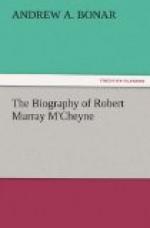Few godly pastors can be willing to change the scene of their labors, unless it be plain that the Cloudy Pillar is pointing them away. It is perilous for men to choose for themselves; and too often has it happened that the minister who, on slight grounds, moved away from his former watch-tower, has had reason to mourn over the disappointment of his hopes in his larger and wider sphere. But while this is admitted, probably it may appear unwarrantable in Mr. M’Cheyne to have prayed for a sign of the Lord’s will. It is to be observed, however, that he decided the point of duty on other grounds; and it was only with the view of obtaining an additional confirmation by the occurrences of providence, that he prayed in this manner, in submission to the will of the Lord. He never held it right to decide the path of duty by any such signs or tokens; he believed that the written word supplied sufficient data for guiding the believing soul; and such providential occurrences as happened in this case he regarded as important only as far as they might be answers to prayer. Indeed, he himself has left us a glance of his views on this point in a fragment, which (for it is not dated) may have been written about this time. He had been thinking on Gideon’s Fleece.
When God called
Gideon forth to fight—
“Go, save
thou Israel in thy might,”—
The faithful warrior
sought a sign
That God would
on his labors shine.
The
man who, at thy dread command,
Lifted
the shield and deadly brand.
To
do thy strange and fearful work—
Thy
work of blood and vengeance, Lord!—
Might
need assurance doubly tried,
To
prove Thou wouldst his steps betide.
But when the message
which we bring
Is one to make
the dumb man sing;
To bid the blind
man wash and see,
The lame to leap
with ecstasy;
To raise the soul
that’s bowed down,
To wipe away the
tears and frown
To sprinkle all
the heart within
From
the accusing voice of sin—
Then,
such a sign my call to prove,
To
preach my Saviour’s dying love,
I
cannot, dare not, hope to find.
In the close of the same year 1837, he agreed to become Secretary to the Association for Church Extension in the country of Forfar. The Church Extension Scheme, though much misrepresented and much misunderstood, had in view as its genuine, sincere endeavor, to bring to overgrown parishes the advantage of a faithful minister, placed over such a number of souls as he could really visit. Mr. M’Cheyne cheerfully and diligently forwarded these objects to the utmost of his power. “It is the cause of God,” said he, “and therefore I am willing to spend and be spent for it.” It compelled him to ride much from place to place; but riding was an exercise of which he was fond, and which was favorable to his health. As a specimen—“Dec. 4, 1838. Travelled to Montrose. Spoke along with Mr. Guthrie at a Church Extension meeting; eight or nine hundred present. Tried to do something in the Saviour’s cause, both directly and indirectly. Next day at Forfar. Spoke in the same cause.”




